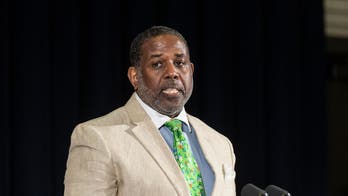The chairman of the Senate Budget Committee said Sunday that the two parties probably will not be able to agree on a budget plan before the election, even as his panel prepares to hammer out a fiscal 2013 blueprint.
Sen. Kent Conrad, D-N.D., speaking on "Fox News Sunday," made clear that he is at peace with Senate Democratic Leader Harry Reid's position that the chamber does not need to bring a budget to the floor.
"I think Senator Reid has made the judgment, probably quite correctly, that there is very little chance that we're going to get the two sides together before the election," Conrad said.
The committee chairman said Congress can simply defer to the agreement from last summer's debt-ceiling debate, which set spending caps for 2013 and beyond.
House Republicans, though, are trying to lower those caps further and make sweeping changes to federal entitlement programs with the budget that passed out of their chamber late last month.
Sen. Ron Johnson, a Republican member of Conrad's committee, rejected the notion Sunday that a divided Congress can let last year's budget agreement do all the work going forward.
"The Budget Control Act is ... about 24 numbers and it's simply not adequate at all," Johnson said, referring to the legislation that emerged from the debt-ceiling debate.
"It's a matter of will. And the fact of the matter is, there are no plans," Johnson said. He said, "we are sorely lacking presidential leadership."
Both Johnson and Conrad appeared to predict a budget stalemate for the rest of the campaign season.
Johnson said Senate Republicans would probably try to force a vote on Republican Rep. Paul Ryan's budget plan.
But asked whether it could pass the Democrat-controlled Senate, Johnson said: "Probably not, and that's a real shame."
Conrad called Ryan's budget "déjà vu all over again," accusing the Wisconsin congressman of pushing fiscal policies reminiscent of those from the George W. Bush administration "that took us to the brink of financial collapse."
He said the reality is Congress can't "accomplish anything" without working together.
"The last time I checked, no law gets enacted in just one House," he said.
Conrad said Congress still needs to work out a "long-term plan" to deal with debt and deficits, but predicted that would not be accomplished on the Senate floor before the election.





